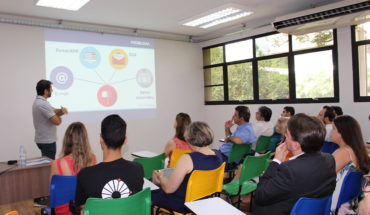Jaime Slomianski, former owner of the Urban Management Agency (AGU) during the administration of the capital government of Miguel Angel Mancera, accumulates multiple research folders against him and points out for alleged irregularities in spending 383 million pesos on bacheo works.
The Capital Prosecutor’s Office announced Monday in a statement investigating Slomianski Aguilar and several collaborators for alleged embezzle in a contract that the AGU handed over to a private company.
However, sources with full knowledge of the case indicated Political Animal that the Prosecutor’s Office has initiated up to eight investigative folders against Slomianski by signing eight contracts during his management, in which the city’s internal contraloy detected various irregularities.
These same sources confirmed that of the eight folders started in total, the CI-FSP/B/UI-B-1 number. C/D/18110/2019 is already in court.
Read: CDMX government accuses Mancera administration authorized 48 irregular constructions
From this folder, a judge has already granted the Prosecutor’s Office an arrest warrant against Slomianski, so the former civilist is being sought by the authorities to appear in court.
In that judicialized folder, the City Prosecutor’s Office detected irregularities in a contract that the AGU awarded on November 11, 2018 to the company Directorate in Engineering and Integral Architecture, for 29 million 980 thousand pesos.
The contract, which was awarded from the AGU-LPN-L-2-068-2018 bidding process, was intended for the company to provide the AGU with “technical and administrative support for the planning, execution and control of public works processes”.
However, the Public Prosecutor’s Office concluded in its investigation that the AGU already had these services and that, therefore, it was unnecessary to hire this company which it benefited from almost 30 million pesos of public money.
According to the indegatory, the AGU holder had to authorise and sign the procurements, since without his endorsement the tenders could not be made. Hence his alleged responsibility in the embezzle.
In this case, from which a capture order was turned against Slomianski Aguilar, the Prosecutor’s Office also investigates three of its collaborators: Mario N., Francisco Javier N., and Enrique N., all former AGU members who worked in the area of procurement and hiring of the unit.
The now defund Urban Management Agency was the unit responsible for paying attention and maintenance to Mexico City’s urban infrastructure such as primary road paving, pothole, gardening and street lighting, mainly.
They hired duvet company to bachear
This is not the first sign of irregularities against the Urban Management Agency under the direction of Jaime Slomianski.
As early as December 2018, just 17 days after the entry of Claudia Sheinbaum’s new government, the AGU’s new directorate of public procurement procedures, then led by Toshimi Jacob Hira, detected million-dollar irregularities in Slomianski’s management.
Specifically, the ‘new’ AGU instructed the capital government’s construction counterloy to investigate possible irregularities in 12 contracts for 383 million pesos that were handed over to companies by this unit.
Read: Urban Management Agency: An Experiment to Better Govern
Among those 12 contracts indicated is the one won by the company Applied Urban Technology.
In February 2019, Political Animal documented that this company, when it benefited from Slomianski Aguilar’s AGU with a contract of 49 million 977 thousand pesos to bump the 16 capital mayoralties, had as a social turn organize advertising campaigns with edecanes.
The company also allegedly simulated bacheo work – reported to the AGU in its reports that it plugged holes in coordinates leading to a remote point in the middle of the Pacific Ocean – and benefited from a forgery of signatures of official documents to allegedly defraud the capital slum of nearly 50 million pesos.
This same journalistic research documented that Applied Urban Technology simulated 75% of bacheo work using as proof photographs of underscavones that had already been covered in other works.
While in the 15% of work it did, the construction supervisory company reported that this contractor used sand and stone shells that, with the rains, were disposed of by hand.
Apart from this case, the ‘new’ AGU the also instructed the city’s construction counterloy to verify the “legality and performance of the work” of the contracts awarded to seven companies in the management of Slomianski Aguilar.
According to the trade GCDMX/AGU/DPCOP/2018-12-17.017, dated 17 December 2018, and the copy of which was obtained by this means through a request for information, the contracts instructed to be investigated were awarded to these companies with only five days apart: between 25 and 30 May 2018, just six months after Slomianski’s management at the AGU ended.
And they were all delivered to carry out the same type of work: maintenance work through re-encarpetation in secondary roads of mayoral Alvaro Obregón.
The beneficiary companies were:
Construction Maintenance and Construction Advice Duma SA de CV, 78 million 883 thousand pesos in two contracts.
Velasco Group, SA CV Engineering and Leasing Services, two other contracts for 63 million pesos.
Supplier of Engineering Facilities and Infrastructure SA of CV, two contracts for 65 million 388 thousand pesos.
CV SA Applied Engineering Processes, two contracts for 68 million.
Terracería Dalsi SA de CV, with a contract of 22 million 947 thousand pesos; GAD SA CV projects, 25 million 559 thousand pesos; and Maggno Projects and Architects SA de CV, 12 million 434 thousand pesos.
The magazine Process Qin September 2018, this group of companies belonged to a single contractor: José Velasco Jiménez, whose network of companies obtained during Slomianski’s administration multiple contracts for the reconstruction and maintenance of the capital’s asphalt folder.
In those contracts, Velasco’s companies committed alleged irregularities.
For example, in the reconstruction and maintenance works of the asphalt folder of the Multimodal Transfer Centers of the Abasto Plant, the companies that won the tender to carry out such work, including Grupo Velasco and Construcción, Mantenimiento y Asesoría de Obras Duma, “lacked sufficient asphalt, so they had to divert the material from other companies with contracts in force”.
“But that asphalt didn’t buy it, it came out of the Mexico City government’s own plant at no cost,” the weekly published.
What we do at Animal Politics requires professional journalists, teamwork, dialogue with readers and something very important: independence. You can help us keep going. Be part of the team.
Subscribe to Animal Politics, receive benefits and support free journalism.#YoSoyAnimal





